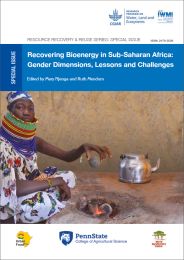Special Issue
Citation:
Njenga, M.; Mendum, R. (Eds.). 2018. Recovering bioenergy in Sub-Saharan Africa: gender dimensions, lessons and challenges. Colombo, Sri Lanka: International Water Management Institute (IWMI). CGIAR Research Program on Water, Land and Ecosystems (WLE). 96p. (Resource Recovery and Reuse: Special Issue). [doi: 10.5337/2018.226]
Abstract
There is a strong link between gender and energy in view of food preparation and the acquisition of fuel, especially in rural areas. This is demonstrated in a range of case studies from East and West Africa, where biochar, human waste and other waste resources have been used to produce briquettes or biogas as additional high-quality fuel sources. The synthesis of the cases concludes that resource recovery and reuse for energy offers an alternative to conventional centralized grid projects which, while attractive to investors and large-scale enterprises, do not necessarily provide job opportunities for marginalized communities. Reusing locally available waste materials for energy production and as soil ameliorant (in the case of biochar) in small enterprises allows women and youth who lack business capital to begin modest, locally viable businesses. The case studies offer concrete examples of small-scale solutions to energy poverty that can make a significant difference to the lives of women and their communities.
ISSN 2478-0510 (Print)
ISSN 2478-0529 (Online)
ISBN 978-92-9090-877-7
Download Chapters
Chapter – 1: Gender and Energy and the Rationale for Resource Recovery and Reuse (RRR)
for Energy
Chapter – 2: Human Waste-to-fuel Briquettes as a Sanitation and Energy Solution for Refugee Camps and Informal Urban Settlements
Chapter – 3: The Impact of Gendered Roles in the Briquette Production and Supply Chain: Lessons Learned from Green Heat Ltd, Uganda
Chapter – 4: Adoption and Economic Impact of Briquettes as Cooking Fuel: The Case of Women Fish Smokers in Ghana
Chapter – 5: Biogas as a Smart Investment for Women’s Empowerment and Livelihood Enhancement
Chapter – 6: An Assessment of the Business Environment for Waste-to-energy Enterprises and How it Affects Women Entrepreneurs in Kenya
Chapter – 7: Gender and Improvement of Cooking Systems with Biochar-producing Gasifier Stoves
Chapter – 8: Women in Energy: Perspectives on Engaging Women Across the Energy Value Chain: The Case of wPOWER
Chapter – 9: Gender as Key in Community Participation
Chapter – 10: Challenges and Solutions for Gender Mainstreaming and Gender Integration in
Research and Development
Chapter – 11: Take-home Messages on Gender and Resource Recovery and Reuse (RRR) for Energy


